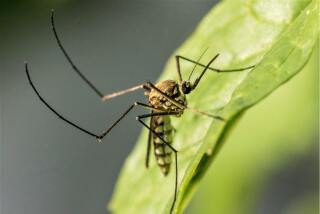7-year-old California boy dies after being infected with brain-eating amoeba
- Share via
A 7-year-old Tehama County boy has died after contracting a rare but severe brain-eating amoeba after swimming in a lake in Northern California, his family said.
David Pruitt died from primary amoebic meningoencephalitis Aug. 7, Crystal Hayley, the boy’s aunt, said.
“We are sad and broken-hearted to report that our sweet little David has passed on,” Hayley wrote on a GoFundMe page for the child’s family.
David was infected after swimming in a freshwater lake last month in Tehama County, although public health officials for the county have not disclosed which body of water.
“People get infected when water containing the amoeba goes up the nose forcefully,” the Tehama County Health Services Agency wrote in an Aug. 4 news release. “From the nose, the amoeba can sometimes migrate to the brain and destroy brain tissue.”
In the initial stage of infection, symptoms can include a severe headache, fever, nausea and vomiting, according to the U.S. Centers for Disease Control and Prevention. As the infection worsens, symptoms — which appear one to nine days after exposure to the amoeba — can further develop into a stiff neck, seizures or hallucinations.
David was rushed to the emergency room July 30 and then flown to UC Davis Medical Center, Hayley said, where he was placed on life support with severe brain swelling. He died eight days later.
There have been only 10 cases of primary amoebic meningoencephalitis, or PAM, reported in California since 1971, according to the Tehama County Health Services Agency. Health officials recommend if anyone has had nasal exposure to warm freshwater in the last 10 days and develops symptoms to consult a doctor immediately.
David’s family has declined several interview requests, but Hayley said that “they want people to be aware of this amoeba and the illness signs.”
According to the CDC’s website, the Naegleria fowleri parasite infects people when contaminated water enters a person’s body through the nose. Infection usually occurs from swimming in warm, freshwater lakes and rivers, although in rare instances, swimmers also can contract the parasite from inhaling untreated pool water.
Because of the extremely low occurrence of primary amoebic meningoencephalitis, and how rapidly the infection progresses, the parasite can be difficult to detect, the CDC website says. No method currently exists that could accurately measure the amount of amoebae in water.
More to Read
Sign up for Essential California
The most important California stories and recommendations in your inbox every morning.
You may occasionally receive promotional content from the Los Angeles Times.











